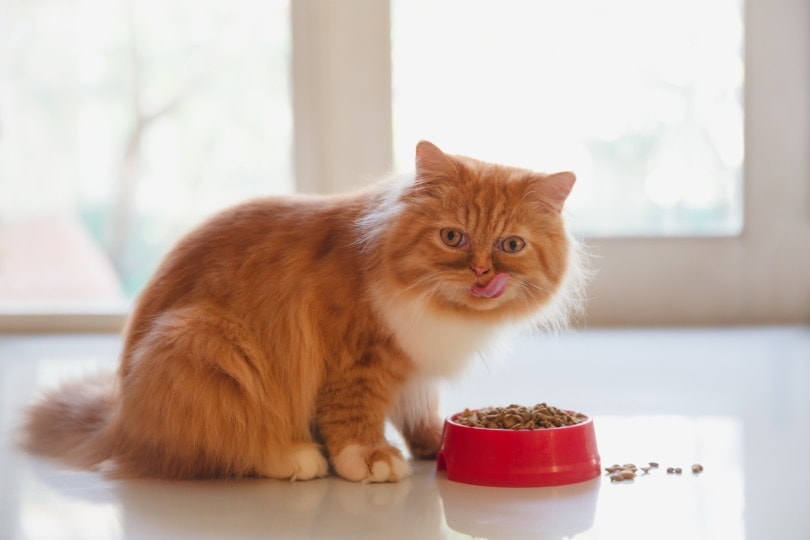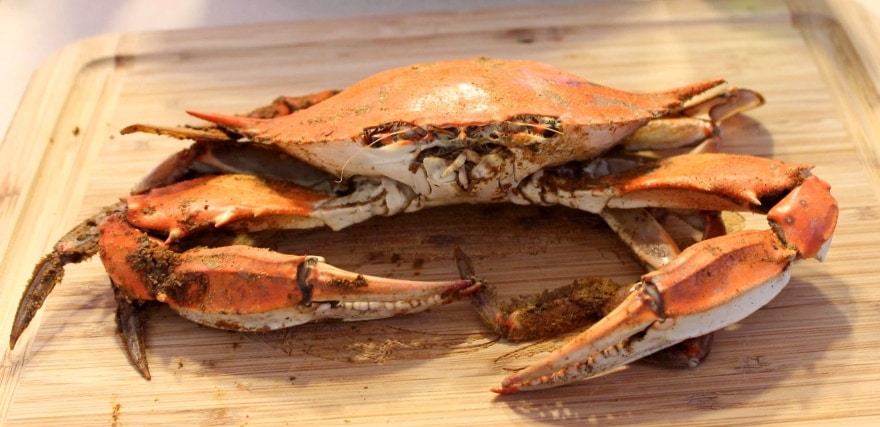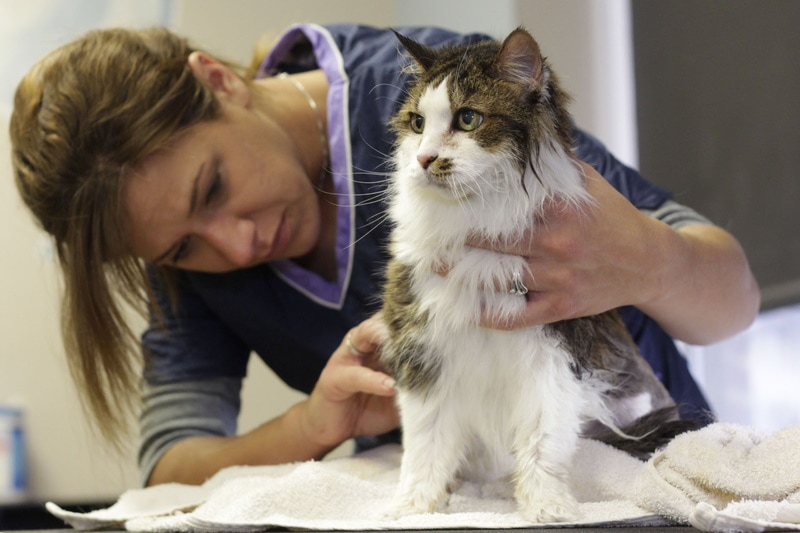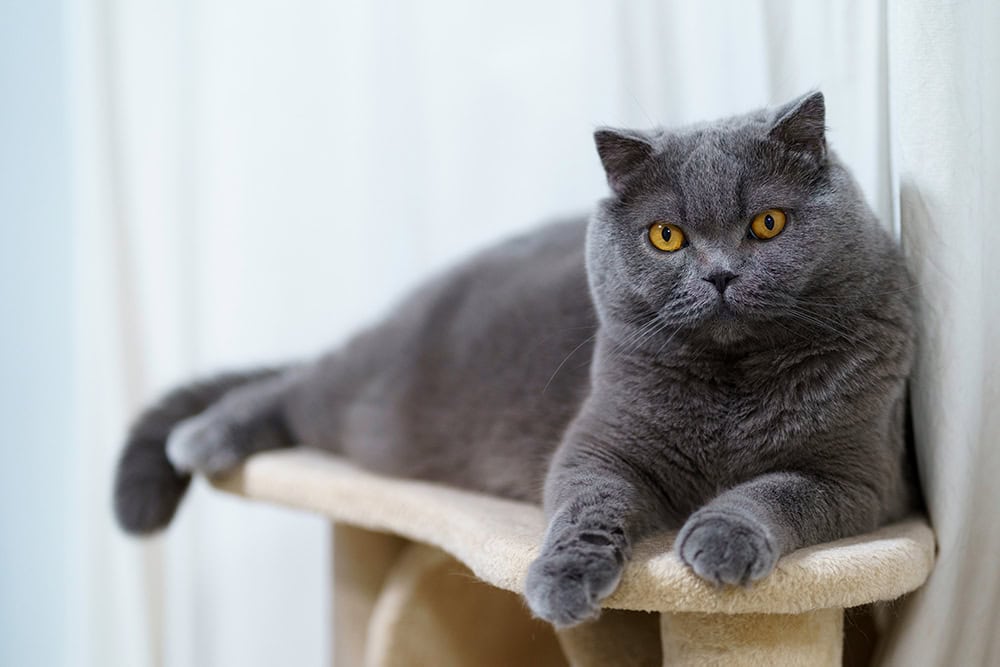Can Cats Eat Crab? Vet-Reviewed Nutritional Health & Safety Guide
By Luxifa Le
Updated on

Cats zero in on any animal proteins they can smell—and they can smell a lot of them—and will start rubbing up against your legs, trying to get a lick of whatever you are having. While some cats will certainly go absolutely nuts for a little bit of crab, many parents wonder what foods they can and cannot feed their pet cats. It’s natural not to want to feed your cat something that will make them sick.
It is perfectly okay for your cat to eat some crab in moderation, but only when adequately prepared. Here’s the down-low on feeding crab to your cat as an occasional treat. However, it would be best to consult with your vet before offering your cat any new food, particularly if they are on a special diet or long-term medication.
Cat Nutrition 101
Cats are obligate carnivores—sometimes referred to as “hypercarnivores”—meaning that they consume at least 70% animal proteins as part of their diet. Obligate carnivores are considered hindgut fermenters, with the highest microbial density in their appendix, colon, and rectum, while ruminants as herbivores are foregut fermenters and most of their microbial fermentation and digestion occurs in their rumen (one of the stomachs) thanks to the versatile bacterial population.1
Carnivores have different gut bacteria and lack the ability to naturally break down plant material in their digestive tract. So, they don’t get the complete nutrients from plant and vegetation matter. At the same time, most vegetation is not necessarily toxic to them. They only don’t derive the whole nutrients from the things they eat unless it’s animal matter.
Because of this dietary need, cats have an innate sense of smell tuned to animal protein.
Cats need a high-protein, low-carbohydrate diet with moderate amounts of fat to thrive. Because of their natural biological makeup, they need to consume high amounts of animal proteins, and filling carbohydrates will prompt them to eat fewer proteins.

Feeding Cats Crab Safely
One of the critical components when it comes to offering your cat some crab safely is never feeding raw crab. The raw crab may contain various pathogens, such as viruses, bacteria, and parasites, that then make their way into your cat’s digestive system. They often cannot finish their lifecycle in the cat, as they’re not their natural host, but they can still lead to a digestive upset that may require veterinary attention.
To ensure that your cat isn’t getting any pathogens, clean and cook crab meat as you would for human consumption. When cooking for cats, don’t use any oils or spices; oils and herbs are for human taste only and can be harmful and sometimes even toxic to cats.
Can Cats Eat Crab Shell?
No, crab shells are too hard and splinter when bitten. Consuming crab shells could lead to mouth and teeth damage, choking, indigestion, or gastrointestinal blockages. If the shell gets caught at the back of their throat or in their esophagus, it may cause respiratory difficulties that require immediate veterinary attention, as well as coughing, retching and vomiting.

Can Cats Eat Crab Sticks?
Crab sticks or imitation crab can have a considerable sodium index that helps it mirror the salty taste of crab. It’s generally made of surimi, a paste made of multiple types of ground-up seafood; it’s kind of like a seafood hotdog.
Surimi, and thus imitation crab, is generally non-toxic for cats, but it’s also low in nutrients because of the amount of processing the surimi goes through from start to finish. It also contains various preservatives and colorings that may be harmful in large amounts, while the high carbohydrate content is not suitable for cats.
In moderation and as an occasional treat, cats can eat a small amount of crab sticks, but they will not benefit from them in any way. The biggest worries with crab sticks are the high sodium intake, phosphorus, carb content, additives, and flavorings. Your cat is unlikely to get sick from a small piece of a crab stick every now and then, but it should certainly not become a regular part of their diet, as it may cause digestive and other health issues, and it predisposes them to obesity.
Crab sticks are people’s junk food, and it’s best to avoid feeding them to your cat if you can.

Can Cats Eat Canned Crab?
Cats should never eat canned crab. Canned meats can contain high levels of sodium and should be avoided. Most canned meats also have various preservatives, such as citric acid, additives, and colorings, that may be harmful or even toxic depending on the particular compound and the amount. Avoid feeding your cat canned meats wherever possible.
Are Other Shellfish Safe for Cats?
Shellfish are a good source of zinc, iron, calcium, and many other vitamins and minerals. However, the amount your cat can safely eat on occasion is unlikely to be significant enough for them to reap many health benefits.
As with crab, you shouldn’t feed any of these meats to your cat raw. Feeding your cat raw shellfish increases the risk of stomach upset due to pathogens commonly associated with seafood. Remove the shell as well, as they may cause damage to the teeth and mouth, choking, or gastrointestinal blockages.
Shrimp and other fish can be fed to cats once cleaned and cooked properly. Remove all the bones, scales, and skin, as it may be contaminated with bacteria, while bones can get stuck at the back of your cat’s throat causing oral injuries, abscess formation, or choking. If swallowed, they can damage the digestive tract and cause serious health issues.
Raw fish should not be given to cats, as it may contain an enzyme called thiaminase, which destroys thiamine, an essential B vitamin. This can lead to a thiamine deficiency with serious neurological signs and vision loss.
Like other foods, you want to make sure that any fish or shellfish you prepare for your cat is cooked without seasonings, especially without salt, spices, or oils.
Now that you know what you can safely feed your cat, it’s just as important to find a bowl that supports their health and well-being. With whisker-friendly bowls and a wide tray to catch any spills, our Hepper NomNom Cat Bowl is our favorite option.
Conclusion
An important part of being a responsible cat parent is knowing which foods are safe for them to eat. Human food is mostly not appropriate to be fed to cats, as it often contains harmful and even toxic ingredients, and even if it’s safe, it is unlikely to fulfill their nutritional needs.
You don’t need to worry too much if your cat steals a piece of cooked crab meat that you had stored away for yourself. However, make sure you never offer your cat any raw crab, shells, or crab meat with any of the spices you cooked it with. Many ingredients used in the preparation of human foods are not suitable for cat’s consumption. Speak to your vet if you have any queries about your cat’s nutrition and health.
See Also: Can Cats Eat Veggie Straws? Vet-Reviewed Facts & FAQ
Featured Image Credit: Piqsels












